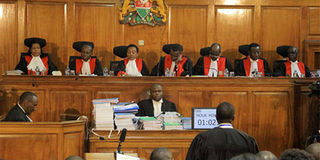Kenyan court flexes muscle and annuls poll

Supreme Court judges at the court during the hearing of the presidential petition on August 28, 2017. The court flexed its muscle and annulled the presidential poll. PHOTO | JEFF ANGOTE | NATION MEDIA GROUP
What you need to know:
As debate on the dependability of international observers continues, there are already suggestions that they cannot comprehend the finer details of African elections and realities
Whatever the case, in an unusually bold four to six majority decision, the Kenyan court ruled that the processing and announcement of results from polling centres was suspect
According to the ruling, the shortcomings of the electoral commission entailed irregularities that “compromised the integrity of the presidential poll”.
That constitutionally established African institutions can at least once in a while truly flex their muscles and assert themselves became abundantly clear in Nairobi on Friday morning.
That was when the Kenyan Supreme Court annulled the results of the recently held but disputed presidential election, confounding millions of sceptics in the country, Africa and the rest of the world.
Although not completely unexpected, for many observers of the Kenyan scene the epic judicial decision was a shocker, particularly given that hordes of international observers had given the country’s General Election a clean bill of health.
As debate on the dependability of international observers continues, there are already suggestions that they cannot comprehend the finer details of African elections and realities.
COMPREHEND
Can foreigners, for instance, fathom the extent to which wily politicians have over the years refined election-rigging to a fine art?
Further, can the same foreigners truly comprehend the role of such factors as rabid and entrenched ethnicity, clientism, rampant voter bribery and the “pouring” of raw cash in the conduct of African polls?
Given these queries, it could be possible that observers used to Western models of democracy could have been at sea in an African electoral environment, fraught with malpractices.
Whatever the case, in an unusually bold four to six majority decision, the Kenyan court ruled that the processing and announcement of results from polling centres was suspect.
DECLARATION
That being the view of the court, it was declared that “the election held on August 8 was not conducted in accordance with the Constitution and the applicable law.”
Speaking on behalf of the Supreme Court, Chief Justice David Maraga — who is also its president — said the results were therefore invalid, null and void.
With that simple declaration, history was made as Kenya became the first country in Africa and only the third one in the world to have the results of a presidential election summarily quashed.
That the precedent-setting Kenyan decision will have major ramifications in Africa is apparent, given that in many countries on the continent, elections are routinely contested, albeit often with little or no effect once the initial furore dies down.
POST-ELECTION CRISES
The latest case in point is Angola, where elections were conducted on August 23, and were expected to mark the end of veteran leader Jose Eduardo dos Santos.
In keeping with the usual practices in Africa, the main opposition party Unita rejected provisional results that gave the ruling MPLA victory.
That aside, protracted and endemic post-election crises are still dogging the Gambia, Zambia, Gabon and several other countries.
Even worse, there are countries such as Cote d’Ivoire, the Democratic Republic of Congo and the Central African Republic where electoral malpractices have for years wreaked havoc, usually with disastrous results.
Moreover, in other countries such as Rwanda, the Republic of Congo and Uganda, there have been fierce politically inspired fires that have proved hard to douse.
DEMOCRATIC TENETS
However quiet and stable some African countries may at times appear to be, questions about the trashing of democratic tenets linger amid accusations of autocratic rule and lack of transparency.
Worse still, countries such as South Africa seem stuck with rulers who have become increasingly unpopular but are difficult to jettison mid-term, utilising the available legal mechanisms.
In recent times in Africa and around the world, a slew of Western-inspired democratic concepts have become virtual clichés that are bandied around ad nauseam by the civil society and human rights activists and groups.
These include such terms as accountability, transparency, pluralism and inclusivity, which have alas lost their lustre as crafty politicians have found ways of going around them.
Unfortunately, in too many African countries, basic decency and the rule of law have practically vanished into thin air even as unscrupulous politicos routinely tinker with elections.
PRESIDENTIAL POLL
Sadly, this happens with impunity through the usual numbers games as well as such crude manoeuvres like ballot-stuffing and the open intimidation of voters and opponents.
In Kenya, the Supreme Court lambasted the Independent Electoral and Boundaries Commission for its poor handling of the presidential poll.
Without mincing words, the court accused the electoral agency of having “failed, neglected or refused to conduct the elections in accordance with the law”.
According to the ruling, the shortcomings of the electoral commission entailed irregularities that “compromised the integrity of the presidential poll”.
The upshot now is that candidates for the country’s presidency will have to take to the hustling once again in preparation for a new poll, which has to be held within 60 days of the Supreme Court ruling as stipulated in the Constitution.
As matters stand, only a truly clean and scrupulously constitutional poll will end the typically toxic Kenyan electoral drama.





